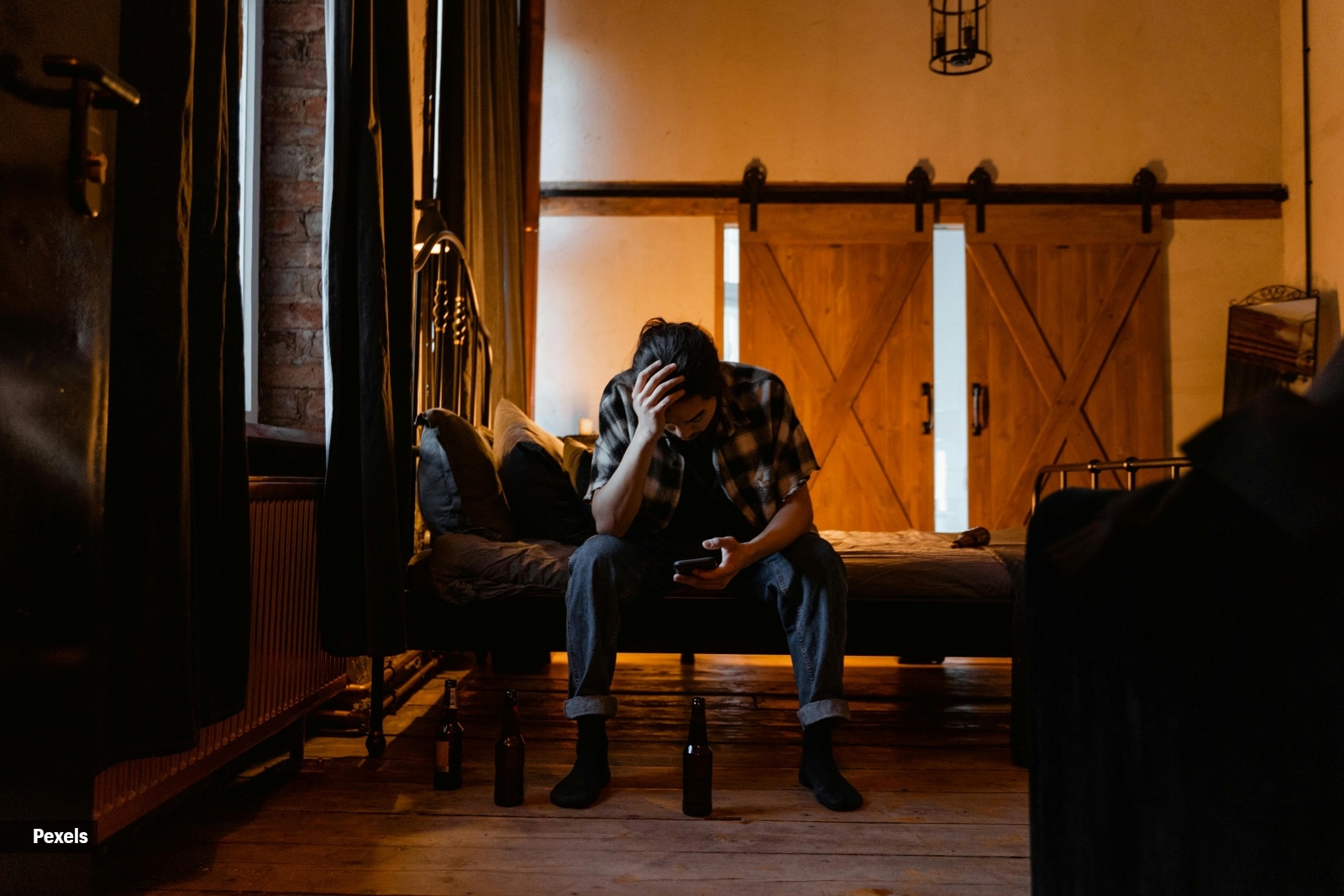📣 For more lifestyle news, click here to join our WhatsApp Channel and also follow us on Instagram
‘Every time I hear my ringtone, it triggers me’: Why some people feel crippling anxiety when their phone rings, prefer texts, voice notes over calls
The physiological responses of telephobia, or phone anxiety, can mirror reactions to real threats — triggering adrenaline surges, palpitations, sweating, and slow digestion.
 Many people prefer texts or voice notes over phone calls because it allows them to pause, think, revise, and give a perfectly calculated response (photo:pexels)
Many people prefer texts or voice notes over phone calls because it allows them to pause, think, revise, and give a perfectly calculated response (photo:pexels)
On a cosy winter afternoon, I was enjoying my perfect cup of adrak wali chai while browsing social media. My plan to unwind was going perfectly until my phone rang. My heart sank, my chest felt heavy, and a wave of panic set in. Even though it was a dear friend calling, I couldn’t bring myself to answer. A gazillion emotions paralysed me as I watched the ringtone fade away.
The next two weeks were spent in mounting guilt, which grew each day as I postponed calling back. Exhausted by this loop of guilt and anxiety, I eventually sent a text with a false excuse. But why did a simple phone call trigger such an intense response? Why could I talk for hours in person or over texts and voice notes, but not on a call?
Like any modern youngster, I turned to the internet for answers. Turns out, I’m not alone. Many people experience the same rush of anxiety when their phone rings — only to follow it up with a sheepish “Hey, you called?” text. Psychology calls it telephobia or phone anxiety: a fear or strong reluctance to make or receive phone calls. It’s more common than you might think.
The responses associated with telephobia can be surprisingly similar to those triggered by physical threats. Many people report palpitations, sweaty palms, and chest heaviness — as if ambushed and thrust under a spotlight without warning. The fear of being perceived as indifferent only worsens the stress. “It’s important to note that most people with phone anxiety aren’t avoiding the person — they’re avoiding the emotional weight that answering a call can bring,” explains Neha Cadabam, senior psychologist and executive director at Cadabams Mindtalk.
Just as certain smells can evoke memories, phone calls can also trigger a conditioned stress response. The brain may associate them with reprimands, bad news, or high-stakes conversations. “If someone has repeatedly experienced stress, conflict, or bad news via phone calls, the ringtone itself becomes associated with dread,” says Cadabam.
The fear of being unprepared
 For many, phone calls feel like unscripted performances where there’s no rewind or delete button
For many, phone calls feel like unscripted performances where there’s no rewind or delete button
“For many, phone calls feel like unscripted performances,” Cadabam points out. People may fear saying the wrong thing, being caught off guard, or being asked for something they can’t emotionally or logistically give.
Bani Kaur Allagh, 25, relates to this. “There’s a lot of pressure to be ‘on’ without warning,” she says. “I’m always anxious about what the other person is thinking about what I’m saying. Without non-verbal cues like expressions or body language, it becomes hard to interpret their tone.”
Similar feelings are shared by Simran Kaur, a 27-year-old illustrator. “I feel unprepared to answer, especially when the caller is someone I know. I want to match their mood and energy, but it’s difficult to gauge that over the phone.”
For media professional Utsav Maurya, 23, telephobia stems from emotional vulnerability. “There’s no place to hide your emotions,” he says, adding that “giving too much power to the other person” often fuels his discomfort.
Phone anxiety isn’t confined to youngsters. “Every time I hear my ringtone, it triggers me,” admits Dr Santvana Pandey, a 44-year-old gynaecologist based in Australia. “I’ve tried changing ringtones and keeping my phone on silent. The anxiety remains constant.”
Why is telephobia so common these days?
Dr Cadabam notes that communication today is mostly asynchronous — messages, emails, and voice notes allow people to respond on their own terms. Phone calls, on the other hand, demand immediate presence. “There’s no rewind or delete button,” she says. “People fear saying the wrong thing or being unprepared for what’s coming.”
Like other stressors, telephobia activates the amygdala — the brain’s alarm centre — triggering textbook fight-or-flight responses such as adrenaline surges, rapid heartbeat, diverted blood flow to muscles, and slow digestion. These symptoms are stronger in people who are anxious, people-pleasing, or neurodivergent.
When telephobia is situational, only specific stressors trigger the anxious response
 If someone has repeatedly experienced stress, conflict, or bad news via phone calls, the ringtone itself becomes associated with dread
If someone has repeatedly experienced stress, conflict, or bad news via phone calls, the ringtone itself becomes associated with dread
Telephobia doesn’t always follow a fixed script. For some, it only surfaces in specific situations. “I feel distress only when I’m forced to pick up a call from someone I don’t want to talk to,” says 30-year-old graphic designer Narender Sogra. “If I anticipate negativity from the caller, the stress hits immediately.”
For 36-year-old media professional Priyanka Bhatt, chaos in her personal life amplifies the feeling. “When things get tough at home, I just shut down,” she says. “It’s not that I don’t want to talk; I just don’t have the energy to explain what’s happening.”
For others, the reaction is trauma-based. “Whenever I hear the same caller tune I had back then, mai wahi pahuch jaati hu [I mentally go back to that time],” shares Dr Kamna Mishra, 50, who lost a loved one 12 years ago. “It feels like if I pick up the phone, all those dreadful conversations — ‘Please sign the ventilator papers,’ ‘He’s critical,’ ‘Chances are low’ — will come back.”
“Neurologically, that’s a deeply ingrained trauma trigger,” explains Dr Cadabam. “The same sound can cause cortisol spikes, nausea, or panic attacks even years later. It’s not ‘just in the head’ — it’s a real, embodied response.”
The haunting guilt and subsequent anxiety that follows afterwards
 Some people report that if they are unable to pick up the calls of a loved one out of anxiety, the guilt keeps haunting them for days or sometimes even months
Some people report that if they are unable to pick up the calls of a loved one out of anxiety, the guilt keeps haunting them for days or sometimes even months
Contrary to popular belief, ignoring calls isn’t indifference. Many people with telephobia describe overwhelming guilt afterwards. “I keep wondering what the call was about,” says Dr Pandey. She even avoids texting to ask why someone called. “If they don’t reply, my anxiety only worsens.”
Cadabam describes this as the “guilt-anxiety loop,” where guilt lingers because it clashes with one’s self-image. “You care, but your anxiety acted first,” she says. This often spirals into overthinking — “Did I let them down?”, “What if it was urgent?”, “I’m a bad friend” — leading to further avoidance. “The longer you delay calling back, the more anxious you feel about explaining why you didn’t answer.”
How can someone manage their phone call anxiety?
Even though telephobia feels unmanageable, Cadabam assures that certain measures can help reduce the severity. She says that phone-call anxiety isn’t just about communication; it’s about control, vulnerability, and energy management. She suggests the given science-based coping strategies:
Name it, don’t shame it: Recognise phone anxiety as a valid nervous system response, not laziness.
Start small: Practise with short, low-stakes calls to trusted friends; use notes or prompts if needed.
Ask before they call: Request a quick text first — knowing what the call’s about eases anticipatory stress.
Ground yourself: Try deep breathing, humming, or squeezing a stress ball to calm your vagus nerve.
Set time limits: Let callers know you only have 5–10 minutes; boundaries reduce the fear of being stuck.
Seek help if needed: Therapy, especially CBT or exposure therapy, can retrain anxious patterns.
Remember: It’s not just about communication — it’s about control, vulnerability, and conserving emotional energy.
📣 For more lifestyle news, click here to join our WhatsApp Channel and also follow us on Instagram
- 01
- 02
- 03
- 04
- 05



























